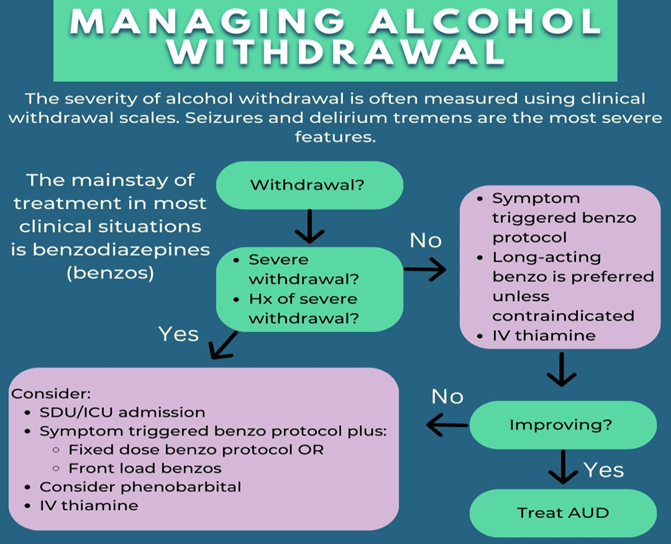A nurse is caring for a client who begins showing signs of alcohol withdrawal delirium. Which of the following medications should the nurse administer?
Methadone
Acamprosate
Disulfiram
Lorazepam
The Correct Answer is D
A. Methadone is an opioid agonist primarily used for the management of opioid dependence and chronic pain. It is not indicated for the treatment of alcohol withdrawal or delirium.
B. Acamprosate is a medication used to support abstinence in individuals who have recently stopped drinking alcohol. It is not typically used to manage acute alcohol withdrawal symptoms such as delirium tremens.
C. Disulfiram is a medication used as an aversive therapy to deter alcohol consumption by causing unpleasant reactions (e.g., flushing, nausea, vomiting) when alcohol is ingested. It is not indicated for the treatment of alcohol withdrawal or delirium.
D. Lorazepam is a benzodiazepine commonly used to manage alcohol withdrawal symptoms, including delirium tremens. It acts by enhancing the inhibitory effects of gamma- aminobutyric acid (GABA) in the central nervous system, thereby reducing the symptoms of alcohol withdrawal such as seizures.

Nursing Test Bank
Naxlex Comprehensive Predictor Exams
Related Questions
Correct Answer is A
Explanation
A. Decreased libido is a potential adverse effect of finasteride due to its action on reducing dihydrotestosterone levels.
B. Prostate-specific antigen (PSA) levels typically decrease while taking finasteride, not increase. It's important for the nurse to educate the client about the potential impact of finasteride on PSA levels and the interpretation of PSA tests.
C. Avoiding grapefruit juice is not specifically relevant to the use of finasteride. Grapefruit juice can interact with certain medications by affecting their metabolism, but this is not a concern with finasteride.
D. The effects of finasteride on BPH symptoms may take several months to become noticeable.
Correct Answer is A
Explanation
A. Lithium can cause hypothyroidism and goiter as adverse effects. Therefore, monitoring of thyroid function and physical examination for thyroid enlargement is necessary during lithium therapy.
B. Constipation is not a typical adverse effect of lithium carbonate. It's more commonly associated with side effects such as nausea, diarrhea, or polyuria.
C. Hyporeflexia is not commonly associated with lithium carbonate use. Lithium more commonly affects the central nervous system, leading to symptoms such as tremors, confusion, and seizures in cases of toxicity.
D. Lithium is more commonly associated with the opposite effect, lowering blood pressure rather than elevating it. It's known to have effects on sodium transport in renal tubules, leading to increased water retention and possibly hypotension.
Whether you are a student looking to ace your exams or a practicing nurse seeking to enhance your expertise , our nursing education contents will empower you with the confidence and competence to make a difference in the lives of patients and become a respected leader in the healthcare field.
Visit Naxlex, invest in your future and unlock endless possibilities with our unparalleled nursing education contents today
Report Wrong Answer on the Current Question
Do you disagree with the answer? If yes, what is your expected answer? Explain.
Kindly be descriptive with the issue you are facing.
